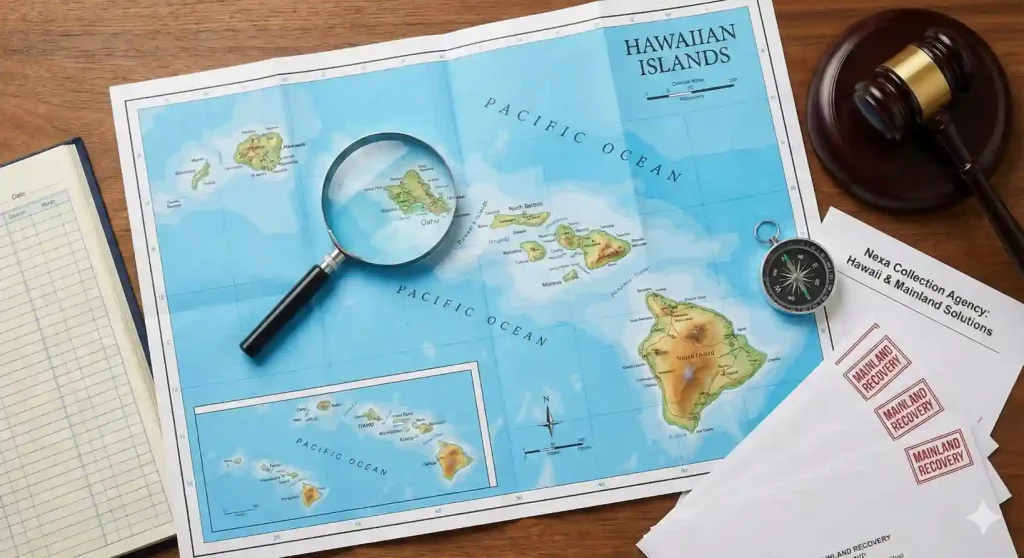Keep Aloha in your brand, not in your AR
From Bishop Street and Kapiʻolani Blvd in Honolulu to Kapolei, Pearl City, Hilo, Kahului, and Kona, overdue invoices stall hiring, inventory, and growth. We turn past-due balances into predictable cash with polite, compliant outreach that protects your reputation.
Nexa provides 100% reputation-safe, all-50-states plus Puerto Rico collections with free credit reporting and zero onboarding fees. Secure – SOC 2 Type II & HIPAA compliant. Since we collect across all 50 states and Puerto Rico, if your debtor moves to the mainland—we don’t stop recovery.
Need a Collection Agency with Local Experience? Contact us
Why teams across Hawaiʻi switch to Us
-
Lower cost to start: Begin with Fixed-Fee touches (~$15 for five contacts), then escalate only when needed.
-
Reputation first: Courteous tone, clear options (pay-in-full, plan, or settle), and audit-ready logs.
-
Nationwide reach: One partner for local accounts and mainland relocations.
-
High ratings & responsiveness: Easy placements, transparent notes, finance-friendly reporting.
Service Types & Pricing (choose your entry point)
• Step 1 — First-Party Courtesy Reminders (Fixed-Fee)
We act as your extension with five soft reminders for fresher balances (0–60 days), sent as if these reminders are coming from you. Typical Fee: $15 per account.
• Step 2 — Third-Party Written Demands (Fixed-Fee)
Five professional letters on our letterhead that prompt action while preserving goodwill. Sometimes digital contacts are mixed if permitted by law in that area. Typical Fee: $15 per account.
• Step 3 — Full Third-Party Collections (Contingency)
Persistent, polite phone + digital contact; payment plans and settlements used when helpful. Typical Fee: 40% of amounts recovered. No recovery, No Fee.
• Step 4 — Legal Collections (Contingency, client-approved)
Attorney escalation only after in-depth review; nominal filing fees initiated and reimbursed upon recovery. Typical Fee: 50% of amounts recovered. No recovery, No Fee.
Notes: In Steps 1–2, payments go directly to you; no extra fees. Start at any step (1–3) by age/amount.
Included free: Bankruptcy screening • Litigious-debtor check • Latest address check • Credit reporting (if you want and the law permits).
Timing tip: Newer accounts recover better—place early.
Recent Results in Hawaiʻi
-
Multi-clinic dental group (Honolulu / Ala Moana): 152 accounts → $27,980 recovered in 45 days with Step 2, plus 10% more set on short plans in Step 3.
-
Property manager (Kapolei & Pearl City move-outs): 88 ledgers → $22,640 in 58 days via Step 2 → Step 3; a skip-trace refresh lifted right-party contact by 16%.
-
Fitness chain (Kailua & Kāneʻohe): 74 memberships → 23% same-month resolution after Step 2 with text-to-pay; recurring billing restarted for 12 members.
-
B2B distributor (Hilo & Kona routes): 41 invoices → $31,200 in 60 days using structured settlements and a net-10 discount for fast pay.
Industries We Serve
Small and large businesses • Medical • Dental (HIPAA compliant) • Schools/training • Utilities • Auto • Professional services (law/CPA/MSP/SaaS) • Gyms & memberships • Senior living • Property management • Parking & towing • Contractors/home services • Distribution & light manufacturing.
How We Work
(This is practical guidance, not legal advice. We tailor to your facts and the latest rules.)
-
Quick discovery: Goals, guardrails, tone, and settlement limits.
-
Secure placement: Simple CSV/API; we map fields and set cadences.
-
Respectful execution: Choice-driven outreach; documented consents and promises-to-pay.
-
Cash + clarity: Real-time notes, dashboards, and finance-ready exports.
Brand & Reputation Protection
-
De-escalation first: Options before pressure.
-
Your controls: You set cadence, channels, settlement caps, and any bureau reporting.
-
Audit-ready: Timestamps for every touch and outcome.
Hawaiʻi Collection Law — Practical Highlights
-
Statute of limitations (SOL):
-
Written and oral contracts: generally 6 years from accrual.
-
Sale of goods (UCC): typically 4 years (parties may shorten by agreement to not less than 1 year).
-
Action step: Track the last payment or written acknowledgment—it can affect the SOL analysis.
-
-
Judgments: lifespan & interest:
-
Judgment validity: commonly 10 years unless properly extended; older judgments risk being treated as satisfied.
-
Post-judgment interest: often 10% per year unless a different lawful rate applies.
-
Action step: If you already have a judgment, calendar renewal/extension deadlines and compute interest accurately.
-
-
Wage garnishment (after judgment):
-
Tiered withholding often summarized as 5% of the first $100/month, 10% of the next $100, and 20% of amounts over $200 (weekly equivalents apply).
-
Action step: Confirm exemptions and employer processing timelines before seeking a writ.
-
-
Bank levies & exemptions:
-
Court orders can reach bank accounts, but exempt funds (e.g., certain benefits) must be honored.
-
Action step: Verify employer and bank details early; prepare declarations addressing exemptions where applicable.
-
-
Call recording:
-
One-party consent—recording is generally lawful if one participant consents.
-
Action step: Standardize consent language and store recordings with the account log.
-
-
Licensing/registration:
-
Consumer recovery tied to Hawaiʻi requires compliance with state registration/licensing and bonding rules.
-
Action step: Keep licenses current and ensure vendor partners align with Hawaiʻi requirements.
-
-
Compliance cadence (quick tips):
-
Respect local calling windows (align to HST) and modern contact-frequency limits.
-
Time-barred debt: Avoid litigation and provide appropriate disclosures before discussing payment options.
-
Credit reporting: Only when accurate, permissible, and substantiated—keep documentation ready.
-
What this means for you:
-
Place early to avoid SOL issues, especially on goods-related invoices.
-
If balances approach the 6-year window (or 4 years for goods), move decisively with Step 2 → Step 3.
-
For existing judgments, use interest accrual and garnishment tools thoughtfully, with exemptions in mind.
Ready to improve cash flow without risking relationships? Contact us for a Hawaiʻi-specific plan and quote.

